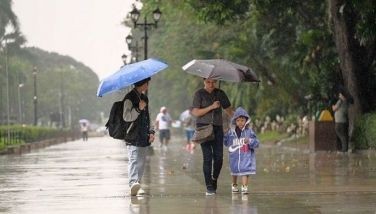Police watching terrorists disguised as deportees
September 9, 2002 | 12:00am
DAVAO CITY — The Philippine National Police (PNP) expressed concern yesterday that terrorists may have hidden among the thousands of Filipino migrants who have been deported from Malaysia.
PNP spokesman Senior Superintendent Leopoldo Bataoil said the PNP’s "Task Force Deportees," supervised by Deputy Director General Edgar Aglipay, is taking measures to identify suspected terrorists who may have disguised themselves and joined the deportees from Malaysia.
"The task force also (wants) to make sure that in the process the police will be able to identify suspected terrorists who are taking advantage of the influx of deportees to enter the country," Bataoil said.
PNP chief Director General Hermogenes Ebdane Jr. ordered Aglipay yesterday to supervise a newly created police task force to assist Filipino deportees from Malaysia.
The task force would integrate all police actions to assist Filipinos who were deported from Malaysia for violating immigration laws.
Aglipay is expected to supervise the operations of Task Group Zamboanga, under Zamboanga City police director Superintendent Mario Yanga, and Task Group Tawi-Tawi, under Tawi-Tawi police chief Senior Superintendent Salipada Linog.
The two task groups will directly be under Central Mindanao police director Chief Superintendent Simeon Dizon.
Aside from ensuring security in the deportee centers in Zamboanga City, Sulu and Tawi-Tawi, Task Force Deportees is also expected to coordinate with other government agencies involved in addressing the sudden influx of Filipinos from Sabah, Malaysia.
Two regional police mobile groups from the Autonomous Region in Muslim Mindanao (ARMM) and Western Mindanao have been deployed to ensure security in the two regions which have experienced an influx of deportees.
Aglipay, former Metro Manila police chief, is expected to be named deputy director for operations vice Deputy Director Edgar Galvante, who retires this month.
Over 400,000 Filipino migrants, charged with violating tough Malaysian immigration laws, are expected to be deported after being held in detention camps in Sabah and Sarawak, both in North Borneo.
From North Borneo, the Filipino deportees are brought by ship to deportee processing centers in Zamboanga City, Jolo and Bongao, and Bataoil stressed the need for closer coordination between police and immigration personnel.
"We have to establish good coordination with immigration personnel so that no suspected terrorist can get past the processing point," the PNP spokesman said.
Bataoil pointed out that in spite of the tedious process in assuring that no terrorist is able to join the deportees, there is no need to deploy special police units, like the Special Action Force (SAF), in the processing areas.
"There is no need to bring in the SAF. We rely on both the regional and provincial mobile groups of these areas. The mobile groups are enough to handle the situation among the deportees," Bataoil said.
He said SAF personnel will only be tapped in certain cases where their expertise is needed.
PNP spokesman Senior Superintendent Leopoldo Bataoil said the PNP’s "Task Force Deportees," supervised by Deputy Director General Edgar Aglipay, is taking measures to identify suspected terrorists who may have disguised themselves and joined the deportees from Malaysia.
"The task force also (wants) to make sure that in the process the police will be able to identify suspected terrorists who are taking advantage of the influx of deportees to enter the country," Bataoil said.
PNP chief Director General Hermogenes Ebdane Jr. ordered Aglipay yesterday to supervise a newly created police task force to assist Filipino deportees from Malaysia.
The task force would integrate all police actions to assist Filipinos who were deported from Malaysia for violating immigration laws.
Aglipay is expected to supervise the operations of Task Group Zamboanga, under Zamboanga City police director Superintendent Mario Yanga, and Task Group Tawi-Tawi, under Tawi-Tawi police chief Senior Superintendent Salipada Linog.
The two task groups will directly be under Central Mindanao police director Chief Superintendent Simeon Dizon.
Aside from ensuring security in the deportee centers in Zamboanga City, Sulu and Tawi-Tawi, Task Force Deportees is also expected to coordinate with other government agencies involved in addressing the sudden influx of Filipinos from Sabah, Malaysia.
Two regional police mobile groups from the Autonomous Region in Muslim Mindanao (ARMM) and Western Mindanao have been deployed to ensure security in the two regions which have experienced an influx of deportees.
Aglipay, former Metro Manila police chief, is expected to be named deputy director for operations vice Deputy Director Edgar Galvante, who retires this month.
Over 400,000 Filipino migrants, charged with violating tough Malaysian immigration laws, are expected to be deported after being held in detention camps in Sabah and Sarawak, both in North Borneo.
From North Borneo, the Filipino deportees are brought by ship to deportee processing centers in Zamboanga City, Jolo and Bongao, and Bataoil stressed the need for closer coordination between police and immigration personnel.
"We have to establish good coordination with immigration personnel so that no suspected terrorist can get past the processing point," the PNP spokesman said.
Bataoil pointed out that in spite of the tedious process in assuring that no terrorist is able to join the deportees, there is no need to deploy special police units, like the Special Action Force (SAF), in the processing areas.
"There is no need to bring in the SAF. We rely on both the regional and provincial mobile groups of these areas. The mobile groups are enough to handle the situation among the deportees," Bataoil said.
He said SAF personnel will only be tapped in certain cases where their expertise is needed.
BrandSpace Articles
<
>
- Latest
- Trending
Trending
Latest
Trending
Latest
Recommended































